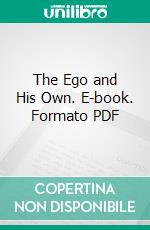Max Stirner eBooks
eBooks di Max Stirner di Formato Pdf
Se si sveglia nell’uomo l’idea di libertà, gli uomini liberi andranno incessantemente di nuovo liberando se stessi; se invece si formano soltanto degli uomini colti, costoro si adatteranno sempre alle circostanze nel modo più educato ed elegante e si forgeranno in sottomesse anime di servi. Che cosa sono per la maggior parte i nostri intellettuali e colti sudditi? Sogghignanti padroni di schiavi, e schiavi essi stessi. Vi è nell’uomo l’impulso a non essere unico ma a sdoppiarsi, a non contentarsi di sé, ma a cercare il secondo uomo, l’uomo spirituale. L’arte crea sdoppiamento, in quanto pone l’Ideale di fronte all’uomo, ma la vista dell’Ideale si chiama religione. L’arte è il principio, ma anche la fine della religione; ne è la compagna. Senza l’arte e gli artisti creatori d’Ideale, la religione non sorgerebbe. L’arte segue l’impulso a fare sbocciare lo spirito in tutta la sua pienezza; a liberare lo spirito dalle tenebre che lo circondano. Allora l’uomo si trova di fronte a Dio. La religione segue una via opposta, mira a conciliare l’ideale o Dio con l’uomo, col soggetto, e a spogliarlo della sua rigida oggettività.
The Ego and His Own. E-book. Formato PDF Max Stirner - Forgotten Books, 2017 -
Therproblem Of securinga reasonably good translation (for in the ease of a work presenting difficulties so enormous it was idle to hope for an adequate translation) was finally solved by en trusting the task to Steven T. Byington, a scholar Of remark able attainments, whose specialty is philology, and 5who is also one Of the ablest workers in the propaganda of Anarch ism. But, for further security from error, it was agreed with Mr. Byington that his translation should have the benefit Of revision by Dr. Walker, the most thorough American student Of Stirner, and by Emma Heller Schummband George Schumm, who are not only sympathetic with Stirner, but familiar with the history Of his time, and who enjoy a knowledge of English and German that makes it difficult to decide which is their native tongue. It was also agreed that, upon any point of difference between the translator and his revisers which consultation might fail to solve, the publisher should decide. This method has been followed, and in a considerable number of instances it has fallen to me to make a decision. It is only fair to say, therefore, that the responsibility for special errors and imperfec tions properly rests on my shoulders, whereas, on the other hand, the credit for whatever general excellence the translation may! Possess belongs with the same propriety to Mr. Byington and his coadjutors. One thing is certain its defects are due to no lack Of loving care and pains. And I think I may add with confi dence, while realizing fully how far short of perfection it neces eerily falls, that? It may safely challenge comparison with the translations that have been made into other languages.
